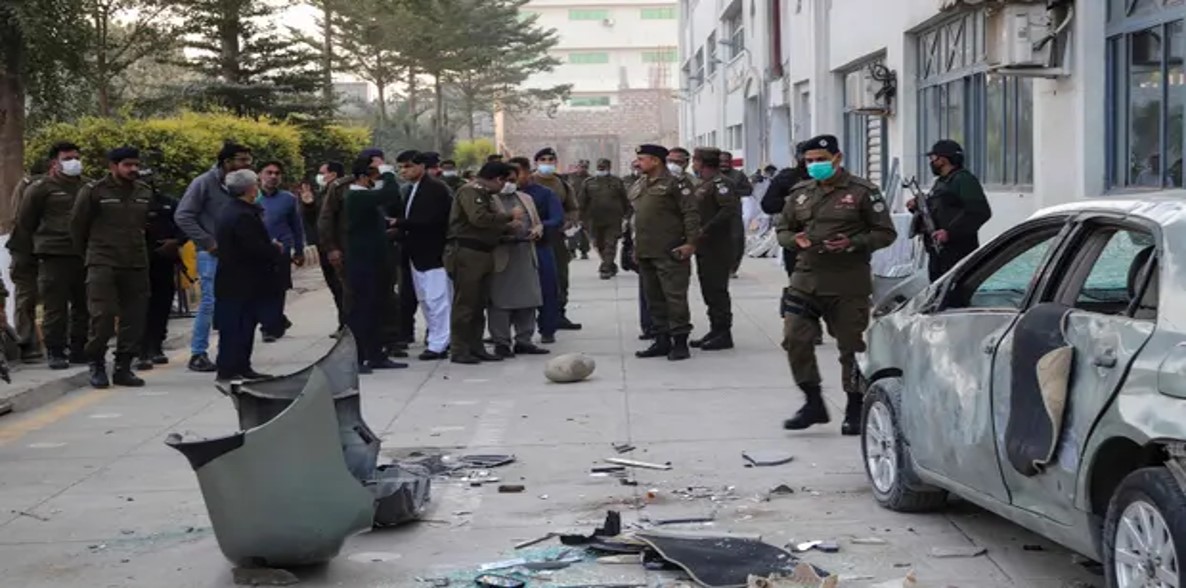A mob in Pakistan tortured, killed and then set on fire a Sri Lankan man who was accused of blasphemy over some posters he had allegedly taken down. Priyantha Diyawadana, a Sri Lankan national who worked as general manager of a factory of the industrial engineering company Rajco Industries in Sialkot, Punjab, was set upon by a violent crowd on Friday.
In horrific videos shared across social media, Diyawadana can be seen being thrown on to the floor, where hundreds began tearing his clothes, violently beating him. He was tortured to death and then his body was burned. Dozens in the crowd can also be seen taking selfies with his dead body.
The incident began when rumours emerged that Diyawadana, who had been manager of the factory for seven years, had taken down a poster bearing words from the Qur’an. By the morning, a crowd began to gather at the factory gates and by early afternoon they had charged into the factory and seized Diyawadana.
The police assistant commissioner Mohammed Murtaza said: “Due to the renovation of the factory building, some posters were taken off from the wall. They may have desecrated posters bearing the name of Prophet Muhammad. Maybe the manager was lynched because of that.”
People gather outside a Hindu temple that was set on fire by a mob after reports that a Hindu boy had urinated in the library of an Islamic seminary, in Bhong, Pakistan 4 August 2021.
He added: “Unfortunately, I can’t affirm or deny anything at the moment. The alibi used for murder is blasphemy but the cause of murder appears personal and targeted. The issue is being investigated.”
Murtaza said at least 50 people had been arrested and more arrests were likely as police went through footage from the scene. Amnesty International said it was “deeply alarmed by the disturbing lynching and killing of a Sri Lankan factory manager in Sialkot, allegedly due to a blasphemy accusation”.
Pakistan, an Islamic state, has notoriously draconian laws against blasphemy, which carry the death sentence. The laws are often used against religious minorities and those accused are sometimes lynched before they are proven guilty in a court. The culture of fear around blasphemy cases means judges are often too afraid to find the accused anything other than guilty.
One of Pakistan’s most infamous blasphemy cases is that of the Christian woman Asia Bibi, who was sentenced to death in 2010 after being accused of blasphemy by her co-workers. Almost a decade later she was acquitted after heavy international pressure.
Pakistan’s prime minister, Imran Khan, condemned the violence in Sialkot. “The horrific vigilante attack on factory in Sialkot and the [killing] of [a] Sri Lankan manager is a day of shame for Pakistan. I am overseeing the investigations and let there be no mistake all those responsible will be punished with full severity of the law. Arrests are in progress,” he tweeted.
But some critics linked the incident and a recent U-turn by the Khan government in its policy towards Pakistan’s hardline Islamic group, Tehreek-e-Labbaik Pakistan (TLP).
TLP was banned by the Khan government and declared a militant organisation. However, after TLP followers started a wave of deadly protests in Lahore in October, killing at least six police officers, the government agreed to lift the ban on the organisation. In one of the videos from the scene in Sialkot, two of the instigators of the violence refer to TLP’s slogans to justify their actions against Diyawadana.
Many fear that incidents of violence over alleged blasphemy cases and mob lynching are escalating as a result. Last week, a police station in Khyber Pakhtunkhwa province was set on fire and police vehicles burned after officers refused to hand over a person accused of blasphemy to the mob.
Hussain Haqqani, a scholar at Hudson Institute and former ambassador to the US, said Pakistan had indulged and empowered extremist Islamists for years. “The state machinery supports those who are perpetrating violence in the name of religion instead of protecting the victims. Only recently, the government cut a deal with TLP, which was responsible for killing policemen during violent protests,” he said.
He added: “The rise of the TLP has normalised murder over blasphemy allegations. What were once random incidents are now becoming an epidemic.”

